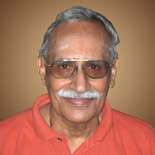|
Go to Part 59 I - The changes that ätmä-jïäna brings about (cont) His antaù-karaëa remains the same but with the crucial difference, that the antaù-karaëa together with the I-sense is a mere instrument like the spectacles. Not being identified with the mind, he is free from all mental problems like worry, disappointment, loneliness and sorrow [366]. He has no sense of guilt or hurt with reference to the past or insecurity about the future. He is unaffected either by praise or criticism. Even if any emotional fluctuation should take place, it is feeble and transient. Like the tanjore-doll, he regains his natural state quickly.
He does not safeguard himself from anything, as there is nothing which exists apart from him. He is ever secure and is not afraid of anything at any time [367], as fear exists only when difference, in any degree, is made in the self through ignorance [368]. Nevertheless, as for the body-mind-sense-complex, he knows that it is vulnerable and he may run to save it like the ajïäné when faced with a tiger. Only, he would not be frightened, as he knows that anätmä is running away from anätmä! He is the person who does not need anything to feel secure and is not afraid of anything to feel insecure.
Heis happy by himself [369], since he is full and complete without any sense of want [370]. Änanda is his very nature. It is different from the änanda that he experienced as a jéva in those situations when the mind did not obstruct the natural änanda. Now, it is intrinsic (svarüpa) änanda and it is continuous without any break and without any change in its intensity. His änanda, which is natural to him, expresses itself as loving kindliness towards all beings [371]. This does not mean that he is oblivious to other people’s behaviour; in fact, he is far more sensitive than others; but he naturally accommodates them, as they are, without judging them. He has no attachment or aversion towards anyone or anything [372]. Should any emotions arise, they do not touch him, since he knows that they are mithyä. [373] He is always objective. He has neither the notion, “I am holier than thou” nor the urge, “I should save the world”. There are no such reactions on his part; even if they take place, they go away even as they arise. His response to the world is born only of compassion. Helping is natural to him. He is a true friend, philosopher and guide. His presence brings about temporary quietness in the mind and contentment to those near him [374]. His mental intent fructifies [375] and everyone can benefit by being blessed by him [376].
Jïäné has no particular life style. Once knowledge is gained, all actions are spontaneous. Free will, likes and dislikes are not factors affecting his action. Though he is a law unto himself, he does not violate moral norms and social conventions. His life is a paradigm of right action. He may be totally withdrawn and silent or move from place to place and be articulate. He may be in a state of abandon and be mistaken to be intoxicated or be impeccable in his behaviour. He may remain oblivious to everything including his physical state. He may teach the çästra or write. For the sake of posterity, he may take steps to nurture and protect the dharma, which he has found to be the most beneficial. He may engage himself in various activities like püjä, japa and upäsanä so that others may follow his example and get citta-çuddhi for gaining self-knowledge. He may set up and run institutions and engage himself in the welfare of all beings. Some of these actions may be due to prärabhda-karma, which it is still functional. But, even when he does karma, the notion of difference between doer and the deed born of ignorance is not there. Whatever he may be doing or not doing, he cannot be assessed by it, as it is ridiculous for the wise jïäné to be judged by the ignorant ajïäné. Wherever he is and whatever he may be doing, he is a blessing to all.
366. Yasminsarväëi bhütänyätmaiväbhüdvijänataù| Go to Part 61
|
|||
|
|||


www.advaita.org.uk
Advaita for the 21st Century



Vedanta - Part 60
VEDĀNTA the solution to our fundamental problem
D. Venugopal

D. Venugopal is a student of Swami Paramarthananda and a direct disciple of Pujya Swami Dayananda. He has successfully completed the long-term residential course in Vedanta and Sanskrit conducted from May 2002 to July 2005 at the Arsha Vidya Gurukulam, Anaikatti.
Go to CONTENTS
Biography
Buy from Amazon UK
. Available from Bharatiya Vidya Bhavan centers at London, New York and Sydney.
. Also through the IBH Books & Magazines Distributors Pvt. Ltd. - contact contact@ibhworld.com. In case of difficulty,pvsankarankutty@bhavan.info can be contacted.
BOOK DETAILS
Publisher: Bharatiya Vidya Bhavan
ISBN: 978-81-7276-457-9
Format : Paperback
Pages: 324
List Price: US$7.00
Where to Buy
AUTHOR DETAILS

